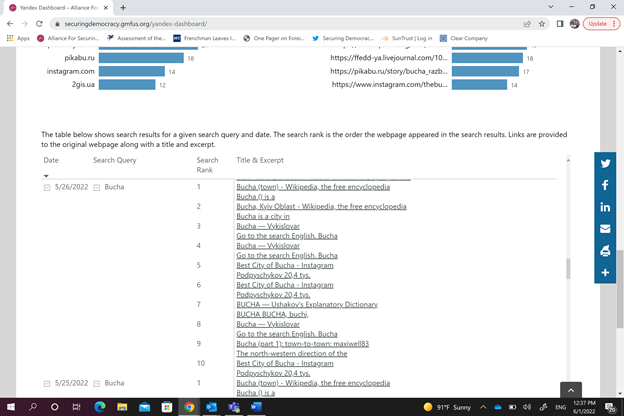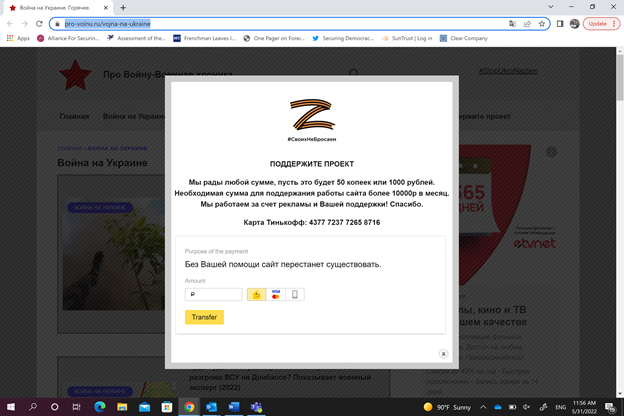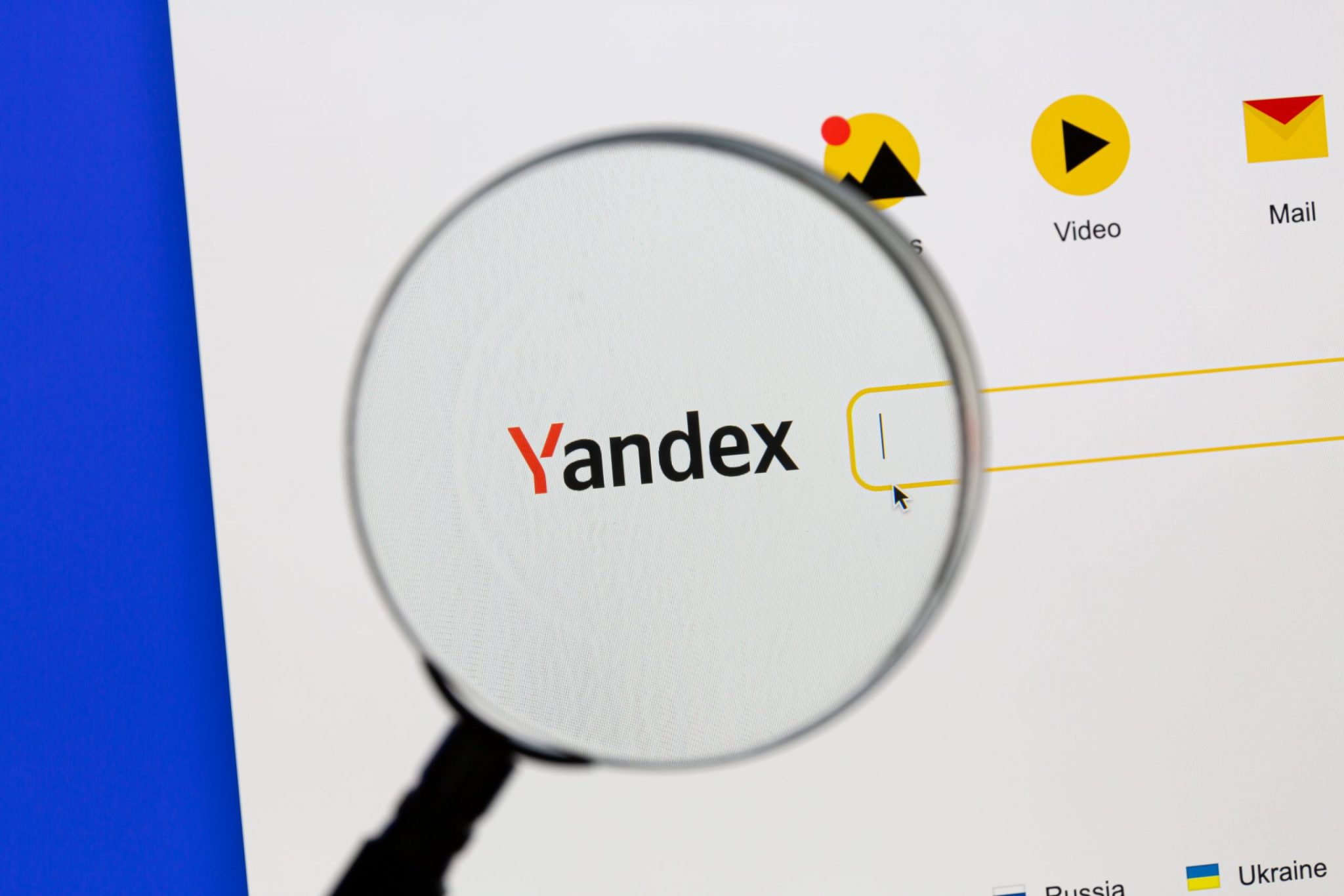Russia’s information environment has become increasingly constricted. Legislation banning the characterization of Russia’s war in Ukraine as anything but a “special military operation” is just one indication of the censorship and cherry-picking that takes place inside a Russian information environment dominated by state-sponsored media outlets.
To better understand Russia’s information environment, the Alliance for Securing Democracy developed a dashboard to show what a Russian citizen or a Russian language speaker outside Russia’s borders would see on the leading Russian language search engine and news aggregator Yandex.ru. ASD’s Yandex Dashboard catalogues the information and sources that Russian speakers encounter as part of general news consumption, as well as when actively seeking information about the war in Ukraine, through Yandex’s search engine. The Yandex Dashboard has three components: (1) “News Headlines in Russia” tracks and analyzes the Yandex news aggregator’s top stories in Russia; (2) “Regional News Headlines” tracks and analyzes the Yandex news aggregator’s top stories by location, focusing on Moscow, Donetsk (Ukraine), the United States, Estonia, and Poland; and (3) “Top Search Results” audits Yandex search results for Russian-language search terms related to the war.
The dashboard aggregates articles daily and search results twice daily, providing a comprehensive database for users to understand the Russian language information space through one of the leading purveyors of content in the country. Here are some insights from the first two weeks of data captured on the dashboard.
News Headlines in Russia
If you’re seeking news from Yandex, most of the top articles come from Russian state-sponsored outlets like RIA Novosti, Lenta, Tass, Gazeta, RT, Izvestia, and Interfax. Between May 16 and June 2, roughly 40 percent of articles displayed in Yandex’s news aggregators were from state-owned sources. Many other articles are from outlets owned by oligarchs close to Russian President Vladimir Putin, such as RBK, a once-independent outlet that came under pressure from Russian authorities for its reporting on Putin, triggering its sale to a loyalist oligarch who controls other pro-Kremlin media. Another top domain is Kommersant, a paper that was heralded for its quality reporting but has increasingly faced scrutiny from the Kremlin, with journalists being forced out and its coverage squeezed. There were virtually no articles from international news outlets, save for three articles from the Russian version of Forbes.
Here’s a snapshot of a day in the news on Yandex from May 25 (links are to Russian-language original sources):
War in Ukraine
- A famous Russian actor, Konstantin Lavronenko, explained why he’s proud of the Russian military’s adoption of the letter Z, which has been drawn on the façade of the theatre where he currently performs.
- A separatist leader from Ukraine’s Zaporizhzhia region announced the region’s intention to join the Russian Federation.
- Russia’s ambassador to the UN claimed Ukrainian military authorities gave their soldiers orders to shoot civilians.
- Russian-Uzbek singer Nargiz was banned from entering Russia until 2072 for criticizing the “special operation” in Ukraine.
- Russia’s air defense has shot down roughly 90 Ukrainian drones.
- The uniform of a British soldier was found in Mariupol close to where Ukrainian forces held positions.
Other Top Headlines
- Russian Economy: A Russian economist predicted a rosier future for the ruble soon enough, and prices in Russia decreased for the first time since August 2021.
- President Joe Biden: His approval rating fell, he was urged to confront the gun lobby in the United States, and he treated Japanese Prime Minister Fumio Kishida shamefully during a joint press conference in Tokyo.
- The United States: Some Americans of Orthodox faith have appealed to the Russian government to allow them to apply for political asylum in Russia.
Regional News Headlines
The articles you’d encounter if you were a Yandex user sitting in Moscow or Donetsk, the largest city in the separatist regions of eastern Ukraine, are unsurprising. They too feature the same types of pro-Russian and anti-Western narratives coming from the same Russian news outlets you’d find in the Top Headlines in Russia section.
If you’re using Yandex from the United States, Poland, or Estonia, the news you’d encounter is hardly more nuanced. There is the occasional article reporting neutrally on events (For example, in Tallinn, Estonia, authorities will install 91 public toilets; the president of Poland announced he will not rest until Ukraine becomes a member of the EU; U.S. Secretary of State Antony Blinken called China the one country capable of changing the world order) and the occasional repurposing of a story first published in a Western news outlet (For example, according to an Axios article, the United States and Saudi Arabia are holding secret talks about increasing oil production; According to an op-ed in Politico, the United States can’t compel the rest of the world to isolate Russia over Ukraine).
However, many of the headlines look very similar to what you might find in Moscow or Donetsk if you were consuming news about the West. Here are some headlines from a two-day period indicative of the type of picture Russian news organizations portray to Yandex users in key Western countries:
Estonia
- A city in northeastern Estonia was forced to turn off streetlamps to save money.
- More than 2,500 NATO reservists failed to attend NATO exercises in Estonia.
- A leading Estonian opposition politician claimed the ruling party and “deep state” are deliberately fanning military hysteria.
- Russian children are being lured into a camp in Estonia where they’re brainwashed by Russophobia (oh, and Ukrainian children can attend the camp for free).
- The minister of defense said there was no diplomatic solution to the war in Ukraine and called for the Russian army to be knocked out of the country (the article juxtaposed the minister’s comments with those by Henry Kissinger calling for the U.S. to stop inflicting losses on Russia).
- Every tenth unemployed Estonian turned out to be a Ukrainian.
Poland
- A renegade British bishop supported Putin and the “special military operation” during a speech in Warsaw.
- Polish security forces organized an attack by migrants on Belarusian border guards.
- A Russian military expert claimed Poland cannot help Ukraine stop the Russian “special military operation.”
- Leader of Chechnya Ramzan Kadyrov promised to show Poland “in six seconds what Russia’s capable of” if given orders by Russian authorities.
- The cost of electricity in Warsaw will rise by 18 percent.
United States
- Russia’s “Kinzhal” hypersonic missile has amazed the United States.
- An ex-Pentagon officer argued President Biden is threatening a war with China the United States isn’t prepared for.
- There’s a decrease in the American birthrate as the LGBT community grows.
- U.S. authorities are collecting data on far-right Americans traveling to Ukraine.
- The Russian Foreign Ministry spokeswoman said the weakening of the EU was an unspoken U.S. objective.
- A conservative analyst claimed President Biden’s policies are threatening the United States with “nationwide self-destruction.”
Search Results
Yandex’s search engine often produces links to information that is either relatively neutral (Wikipedia entries in Russian language) or reliably pro-Kremlin in its slant (Russian state-sponsored media). But the results can occasionally be more nuanced —or more head-scratching. For example, take the results of the search query “Bucha,” the Ukrainian town where Russian forces committed atrocities on such a horrific scale that they are being considered war crimes. On some days, a user would find among the top three links articles and blogposts in Russian debunking Kremlin propaganda that Ukrainian authorities committed the atrocities themselves. On other days, those links would be further down in the search results, while articles and blogposts supporting the Kremlin’s position are featured prominently. And yet on other days, there’s almost nothing of substance at all in the search results, just Instagram accounts, dictionary entries, and the official website of Bucha; it’s as if the war in Ukraine and the atrocities in Bucha never took place at all.

If a user searches for “War + Ukraine” on Yandex, the results are also mixed. Frequently occupying the second ranked results, behind the Wikipedia entry on the Russo-Ukrainian war, is a website that chronicles the war’s events, “pro-voinu.ru” (translated in English as “About the War”). This site may refer to “war” and not a “special military operation,” but one look at the site’s banner tells you everything you need to know about its point of view (the use of the hashtag “#StopUkroNazism”). The user is also automatically shown a pop-up soliciting support for the website; the use of the Russian military symbol “Z” and slogan “своих не бросаем” (“we don’t abandon our own” or “no man left behind”) ought to dispel any doubts about the site’s intentions.

Also featured in the top ten ranked results are articles from Russian state-sponsored media organizations describing the war as a “special military operation,” praising Russian achievements, and heaping scorn on Ukrainian leaders and their western allies. In addition, among the top results are several outlets connected to sanctioned Russian individuals or entities. For example, the fifth most common domain in search results is Tsargrad.tv, a pro-Putin outlet owned by Konstantin Malofeev, who the United States sanctioned for his role in the annexation of Crimea. The outlet is also at the center of a recent U.S. Department of Justice case against a U.S. citizen, Jack Hanick, a former Fox News producer who is charged with violating sanctions for helping Malofeev launch the channel. And the 14th most observed domain is News-Front.info, a website that the U.S. State Department listed as one of the six pillars of Russian disinformation and that the U.S. Department of the Treasury has asserted is directed by Russian intelligence. The latter site is banned from most Western social media platforms. Sprinkled among the pro-Russian links, however, are links to the BBC and Deutsche Welle’s Russian services that provide a markedly different version of the events transpiring in Ukraine.
The Yandex Dashboard reveals how Yandex.ru, as an aggregator of news and as a search engine, directs Russian speakers worldwide to manipulated information—and at times to outright disinformation. As Russia continues to pass more draconian censorship laws and stifle free speech and independent journalism, many Russians will consume news that portrays the Kremlin’s worldview. There are, of course, ways for Russian citizens to find independent sources of journalism. VPN services have been in increasing demand, and even Yandex’s search engine occasionally provides links to unbiased information. For the most part, however, there is an information iron curtain descending on Russians; this dashboard shows one part of that curtain.
The views expressed in GMF publications and commentary are the views of the author alone.





